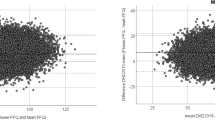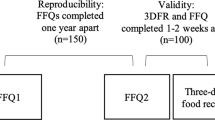Abstract
Objective: To evaluate reproducibility and validity of a self-administered food frequency questionnaire (FFQ) to determine the dietary supplement use.
Design: Questionnaire data were compared with dietary records (DR) in four 7 day periods for validity. FFQ1 and FFQ2 administered at an interval of approximately one year were compared for reproducibility.
Setting and subjects: A total of 361 samples were selected for a validation study of a questionnaire from the subgroup of the Japan Public Health Center-based prospective Study on cancer and cardiovascular disease (JPHC Study) cohort II. Categories of dietary supplements in the FFQ were ‘multivitamins’, ‘β-carotene’, ‘vitamin C’, ‘vitamin E’, and ‘other supplements’. For each category, inquiries were made as to the brand name, frequency and duration of use. A dietary supplement user was defined as a subject who used a dietary supplement one or more times a week for a year or longer.
Results: Prevalence of overall supplement use was 10.9%. Percentage agreement between FFQ1 and FFQ2 was 91.7%. Sensitivity and specificity of supplement use by FFQ were 80.6% and 89.2%, respectively. Sensitivity was high for ‘vitamin C’. When the self-reported categories were corrected, sensitivity for ‘multivitamins’ and ‘vitamin E’ improved.
Conclusions: The FFQ on dietary supplements used for the JPHC 5 y follow-up survey was valid to determine overall use and well-defined dietary supplement use such as vitamin C. Categories must be corrected when determining multivitamin and ‘vitamin E’.
Sponsorship: Grant-in-Aid from the Ministry of Health and Welfare of Japan.
European Journal of Clinical Nutrition (2001) 55, 360–365
This is a preview of subscription content, access via your institution
Access options
Subscribe to this journal
Receive 12 print issues and online access
$259.00 per year
only $21.58 per issue
Buy this article
- Purchase on Springer Link
- Instant access to full article PDF
Prices may be subject to local taxes which are calculated during checkout
Similar content being viewed by others
Author information
Authors and Affiliations
Contributions
Guarantors: J Ishihara, T Sobue and S Tsugane.
Contributors: JI was responsible for analyzing data and writing this manuscript. TS was responsible for conducting JPCH cohort II FFQ validation study. SY contributed to statistics and data analysis. SS provided advice in data analysis and commented on manuscript. MA contributed to the collection of dietary records. ST planned the JPHC FFQ validation study and was the principal investigator of the JPHC study.
Rights and permissions
About this article
Cite this article
Ishihara, J., Sobue, T., Yamamoto, S. et al. Validity and reproducibility of a self-administered questionnaire to determine dietary supplement users among Japanese. Eur J Clin Nutr 55, 360–365 (2001). https://doi.org/10.1038/sj.ejcn.1601164
Received:
Revised:
Accepted:
Published:
Issue Date:
DOI: https://doi.org/10.1038/sj.ejcn.1601164



